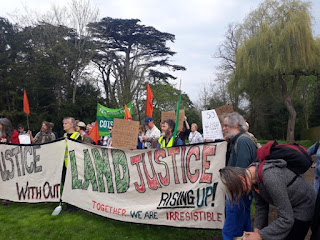Country Matters
By The Hodge
“…our pedigree
farm livestock is just as much a part of Britain’s heritage as is her castles,
her art collections or her historic churches.”
HRH The Prince of Wales, 1996 writing in The Ark
So, I got into trouble last month. Well, it’s not so unusual, it happens quite frequently. Part of life’s rich tapestry – one shrugs and move on. What else can you do?
My crime? Inducing you, dear readers, to eat rare breeds of livestock.
Hang him! Flog him! Send him to the colonies!
You may recall that I discussed farm shops, real and phony, and
suggested you give up the convenience of the mega-emporiums, (supermarkets to
you), and shop instead for real tasty, delicious, healthy food at either of the
two real farm shops, one of which specialises in rare breeds.
So what are rare breeds?
Rare breeds as defined no only here in Britain but within the confines of the
UN and all its members, are pedigree, native animals whose populations have
fallen into decline so that they’ve become…. rare. Native? Doesn’t mean they
wander about in a loincloth and with a spear in their hoof but that they were
developed in this country.
But, and this was the viewpoint of the big commercial farmer back in
the 1970s when such breeds were first recognised and steps began to be taken to
rescue them, if they’re rare they can’t be much good can they?
There’s many reasons for their rarity. For a start, many don’t suit
intensive factory farming. Stick a Gloucestershire Old Spots pig in an
intensive indoor pig unit and it’ll soon turn up its trotters and snuff it.
Others are not specialist enough at what they do. Most milk is derived
nowadays from mega-producing black and white Holstein cattle. The output by
comparison of a rare Red Poll cow is minute so it’s fallen on the wayside
despite its hardiness, the high quality of its milk and the fact that surplus
male offspring make excellent beef. Specialist dairy farms just want
mega-producers as it’s the only way they can survive with the stupid prices
they receive for milk.
Little primitive black sheep like Hebrideans are a total anathema to a
commercial shepherd with his flock of hundreds of Dutch Texel sheep with their
huge rumps and rapid growth from compound feeds, but put them both on the side
of a mountain where food has to be searched for and the wind and the rain blows
hard and the Hebridean will be in his element and the Texel will be pushing up
daisies.
And farming is a fashion industry. If Old MacDonald imports a flock of
Rouge de l’Ouest sheep from France and sends his Southdowns off to market in
disgust, sure as eggs is eggs, Farmer Giles next door and all his other
neighbours will soon be following suit. Just like sheep.
So these rare breeds should really just be allowed to die out,
shouldn’t they. They can’t hack it compared with the Limousins and the Belgian
Blues (beef cattle), the Beltex and the Bleu de Maines (sheep) or the Pietrains
and the Durocs (pigs) so let them go. We don’t need dodos and dinosaurs.
Or maybe we do need to conserve them after all in which case, the last
thing you should be doing is telling people to go and eat them! Stupid boy!
Well, no actually. We must conserve them because they all have
attributes that differ from the modern breeds big commercial farmers rely on.
And we must eat them too. Many animals are, for one reason or another, not
suitable to breed from. For a start, most males are surplus to the needs of the
breeder. One ram can look after the needs of 30 or 40 ewes and bulls and boars
are similar. If there’s no market for the surplus – i.e. if we don’t eat them –
then farmers struggle to keep them. So having a healthy market for the
non-breeding stock is essential for the health of any of these breeds. So go
and buy the meat!
Am I forgiven?
























